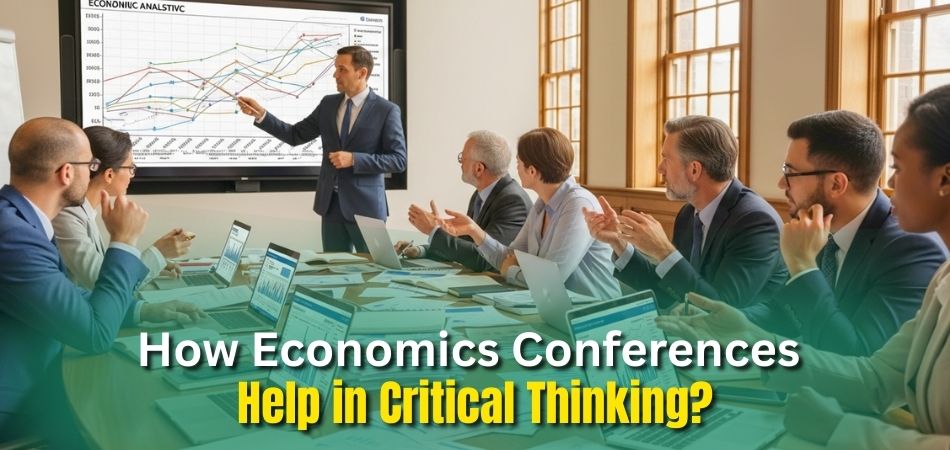Economics conferences bring together curious minds, innovative thinkers, and professionals eager to explore real-life economic challenges. These events offer a platform to exchange ideas, analyze complex issues, and collaborate on impactful solutions. Participants engage with experts, find new perspectives, and strengthen their problem-solving abilities through active discussions and research presentations.
So, how economics conferences help in critical thinking?
Economics conferences help in critical thinking by letting people share ideas, solve real problems, and hear from experts. Attendees learn to see issues from different sides, ask good questions, and think deeply about new topics. They also practice using knowledge in real situations to find smart solutions.
Keep reading to explore how attending these conferences can sharpen your reasoning skills and transform your economic perspective for lasting success.
How Economics Conferences Help in Critical Thinking?
Economics conferences are powerful gatherings where experts, students, and policymakers share insights and challenge established ideas. These events combine learning with debate, pushing participants to think more critically about real-world problems. Here is how economics conferences help in critical thinking.

Exposure to Diverse Perspectives and Ideas
Economics conferences gather economists, researchers, and policymakers who hold contrasting viewpoints on topics like fiscal policy or inequality. This diversity of thought challenges attendees to compare evidence and reconsider personal assumptions. Engaging with opposing perspectives builds mental flexibility and intellectual honesty. Participants learn to evaluate claims critically, fostering open-minded analysis rooted in logic rather than bias.
Listening to discussions between different economic schools—like Keynesian, neoclassical, or behavioral economists—forces participants to analyze arguments carefully. For example, debates on international trade can reveal how data interpretation shapes conclusions. Exposure to these viewpoints refines decision-making and nurtures deeper critical inquiry. Over time, attendees develop the intellectual agility essential for understanding complex global economic dynamics.
Engagement in Debates and Q&A Sessions
Conferences thrive on discussion, where presenting or listening to research tests both ideas and reasoning skills. Attendees must analyze data, question assumptions, and form coherent responses quickly. These debates train participants to recognize flawed logic and unsupported conclusions. The process builds confidence in speaking clearly while defending evidence-based perspectives.
Q&A sessions create interactive learning that transforms passive listening into active evaluation. Asking insightful questions requires understanding context and recognizing logical gaps. By challenging presenters respectfully, participants refine analytical skills and logical structure. This continuous exchange of questions and counterpoints nurtures deeper reflection and promotes a culture of intellectual curiosity.
Networking and Informal Discussions
Outside formal sessions, conferences provide casual spaces—coffee breaks, hallways, or receptions—where new ideas often emerge. Conversations in these moments can be surprisingly thought-provoking and help uncover hidden assumptions. When peers question your reasoning, you’re pushed to see issues from multiple viewpoints. This spontaneous exchange encourages clearer thinking and more balanced judgment.
Informal dialogue among economists worldwide broadens horizons and builds analytical awareness. Discussing new research methods or global challenges improves adaptability and intellectual openness. For example, participants at conferences in Australia, the United States, or the United Kingdom often share local insights that challenge traditional frameworks. Such exchanges deepen understanding and foster collaborative critical thinking beyond academic boundaries.
Preparation and Presentation of Research
Presenting research at a conference requires deep self-reflection and intellectual discipline. Crafting a paper involves evaluating data, questioning conclusions, and anticipating feedback. This process helps participants identify weaknesses in their reasoning and refine their arguments. Preparing to face critical audiences develops confidence and precision in communication.
Similarly, reviewing or discussing others’ work trains analytical awareness. Evaluators must recognize logical consistency, methodological accuracy, and evidence strength. This mutual critique sharpens reasoning and enhances professional judgment. The back-and-forth of presentation and evaluation forms a powerful feedback loop that strengthens critical thinking and academic credibility.
Workshops and Skill-Building Sessions
Workshops offer practical opportunities to apply critical thinking to real economic challenges. Activities might include analyzing data sets, running policy simulations, or testing econometric models. These exercises force participants to connect theoretical knowledge with applied reasoning. By solving realistic problems, attendees develop stronger analytical and problem-solving abilities.
Hands-on learning teaches how to separate assumptions from facts and avoid cognitive biases. Participants learn to distinguish correlation from causation and validate results objectively. This process builds confidence in drawing conclusions from complex information. Over time, workshops transform critical thinking from a theoretical concept into a practical skill for real-world economics.
What Happens at Economics Conferences?
Economics conferences are exciting events filled with fresh ideas, lively discussions, and practical learning. They bring people from universities, research centers, and industries together. Everyone comes to share knowledge, exchange experiences, and explore new perspectives. Here is what actually happens at economic conferences.
- Expert Talks: Renowned economists and researchers share insights about markets, policies, and innovation. Their talks inspire curiosity, helping attendees understand current economic challenges better.
- Panel Discussions: Groups of experts debate complex issues from different viewpoints. These discussions help listeners see problems clearly and think about possible solutions deeply.
- Research Presentations: Scholars and students present studies on new theories, data models, and findings. They get helpful feedback that strengthens their understanding and reasoning.
- Interactive Workshops: Participants work on real economic problems using hands-on activities. These sessions improve problem-solving skills and turn theoretical ideas into practical learning experiences.
- Networking Opportunities: Conferences create space for conversations during breaks, lunches, or social events. These moments help people share experiences, find mentors, and build professional friendships.
- Q&A Sessions: After each session, audiences ask thoughtful questions about methods, results, or implications. These conversations make learning active and sharpen analytical thinking.
- Poster Exhibits: Researchers display posters showing their data and conclusions. Visitors walk around, discuss findings, and exchange fresh ideas about research approaches.
- Award Ceremonies: Outstanding papers, speakers, or student works receive recognition for excellence. These awards motivate participants and highlight valuable contributions in economics.
- Cultural Experiences: Many conferences include tours or cultural events that show local traditions. These fun activities help people relax and build friendly global connections.
Collaboration and Networking as Catalysts for Critical Thought
Conferences bring together people from universities, industries, and government offices who share a common passion for understanding economics. These interactions open doors to new knowledge, experiences, and perspectives. Talking with others helps participants see problems from fresh angles and question their usual ways of thinking. Collaboration in such settings builds open-mindedness and encourages deeper, more analytical thought.
Networking goes far beyond collecting contacts or exchanging greetings. Conversations during breaks, meals, or social events often lead to meaningful intellectual exchanges. When people debate ideas or share research findings, they challenge one another to think harder and question assumptions. Through these genuine discussions, participants refine their reasoning skills and develop stronger, more balanced approaches to solving economic problems.
How to Improve Your Critical Thinking During a Conference?
Attending a conference is more than just listening to experts talk about their work. It’s about learning how to think smarter, ask better questions, and see things differently. Each session gives a chance to train your mind to dig deeper. With these tips, you can improve your critical thinking during sessions and make your conference experience truly meaningful.
Plan Beforehand
Before the conference begins, spend some time looking at the schedule and speaker list. Read a little about the topics you’ll hear so you know what to expect. Write down a few questions that you want answered during the sessions. This preparation helps your brain stay active and curious when you finally attend. It’s easier to think critically when you already understand the background of a discussion.
Listen With Focus
Listening sounds simple, but it’s one of the hardest skills to master. Try not to just hear the words; instead, focus on what the speaker is really saying. Think about how their ideas connect to what you already know. If something doesn’t make sense, note it down for later. Concentrated listening helps you find meaning behind facts and encourages deeper understanding.
Ask Smart Questions
Good questions lead to strong thinking. During Q&A sessions, raise your hand when you have a question that adds value to the discussion. Ask for examples, reasons, or real-life applications of what you just heard. This shows that you’re thinking carefully about the topic instead of just accepting it. Smart questions also help everyone in the room learn something new.
Join Group Talks
Many conferences include small group sessions or panel discussions. These are great places to share your thoughts and hear different opinions. Sometimes, when you explain your ideas out loud, you’ll notice parts that don’t quite fit together. Listening to others can also help you see your topic in a new light. This teamwork helps build stronger, sharper thinking skills.
Take Useful Notes
Don’t just write everything word for word—focus on key ideas, examples, and questions that come to mind. Use short phrases, arrows, or drawings if that helps you remember better. After each session, spend five minutes reviewing what you wrote. This helps your brain connect information while it’s still fresh. Good note-taking makes complex ideas easier to understand later.
Join Post-Session Chats
After a session ends, speakers and participants often stay around for casual discussions. These are great chances to share your thoughts and listen to others’ opinions. You might meet someone with a completely different viewpoint that makes you think harder. When you talk with people who challenge your ideas, your mind becomes more flexible and thoughtful.
Choose the Right Event
Improving your thinking also depends on attending the right type of event. When choosing a suitable economics conference, pick one that matches your interests and learning goals. Look for conferences that include debates, workshops, and discussion sessions. These formats give you more chances to think, question, and interact with others. The better the event fits your goals, the more you’ll grow as a thinker.
Reflect After Each Day
At the end of every conference day, take a few quiet minutes to think about what you learned. Ask yourself which ideas made the biggest impact and why. Reflecting helps you connect different topics and understand how they relate to each other. When you think back on your day, you strengthen your memory and turn simple learning into real understanding.
How Conference Learning Strengthens Long-Term Thinking and Decisions?
Attending a conference doesn’t end when the event finishes. The ideas you learn there stay with you and shape your future. Every discussion, question, and note helps build smarter ways of thinking. Over time, these lessons turn into stronger skills for real-life decisions. Let’s look at the key areas where conference learning continues to grow your abilities.
Building Strong Thinking
Conferences help you practice thinking clearly and questioning ideas instead of accepting them right away. When you listen to experts and debates, you start to understand how people reason through problems. This habit helps you weigh information before making a choice. Over time, your brain learns to look at both sides of an issue carefully and fairly.
Improving Research Skills
Many people who attend economics conferences work on research or data projects later on. By seeing how others present their work, you learn how to collect, test, and explain information better. This helps you avoid mistakes and think about real-world meaning instead of just numbers. It also teaches you to stay curious and keep learning new things.
Better Teaching Ideas
Teachers and students both benefit from conference learning. Teachers can use what they learn to make lessons more interesting and clear. They can explain hard topics through real examples discussed at the event. Students also gain fresh ideas when teachers include new research or debates from conferences in class discussions.
Smarter Policy Choices
Economists and government workers often use lessons from conferences when they plan or review public policies. Listening to experts and analyzing data together helps them understand which solutions really work. When they face real decisions—like setting budgets or planning taxes—they can use what they learned to make fair and smart choices.
Confidence in Decisions
Critical thinking from conferences gives people confidence when making tough calls. Instead of guessing or copying others, they build answers through logic and facts. This confidence shows in classrooms, offices, and policy meetings. It helps people trust their reasoning and feel sure about the steps they take.
Real Problem Solving
Conferences train your brain to handle complex problems in daily life. You learn to break big issues into smaller ones and find practical answers. This method works not only in economics but also in business and community work. Thinking deeply and asking good questions helps you solve problems faster and with fewer mistakes.
Future Career Growth
The lessons learned at conferences stay useful for years. They make you a better communicator, thinker, and decision-maker. People who think critically often stand out in their careers because they handle challenges wisely. Employers and organizations value those who can reason clearly and make sound choices.
Why Developing Critical Thinking Is Vital in Modern Economics?
Economics today is full of fast changes, global issues, and complex decisions. Thinking deeply helps people see the truth behind numbers. Critical thinking turns information into understanding and makes smarter choices possible in every part of economics. Here are some key areas where critical thinking makes a real difference.
Understanding Complex Markets
- Market changes happen quickly, and good thinkers can spot patterns others might miss. They connect ideas and find reasons behind trends.
- People who analyze carefully make fewer mistakes when reading data or following sudden changes in trade and prices.
Solving Real Problems
- Real-world issues like poverty or inflation need logical solutions. Thinking clearly helps people plan strong strategies for better outcomes.
- Critical thinking helps find cause-and-effect links in messy data, turning confusion into useful answers that actually help people.
Making Smart Policies
- Governments depend on economists who can think clearly when creating or reviewing new policies. This skill helps avoid poor results.
- Smart policy decisions rely on understanding both benefits and risks before making choices that affect jobs, trade, and money.
Building Strong Research
- Researchers use critical thinking to design fair and accurate studies that give reliable conclusions. They avoid personal bias or false ideas.
- Good research asks questions that dig deeper and test information carefully, making reports stronger and more trustworthy for readers.
Encouraging Honest Debates
- Honest discussion helps new ideas grow and weak arguments fade. Conferences and classroom talks help people question ideas respectfully.
- When people share opinions openly, everyone learns to listen better and understand different viewpoints without anger or judgment.
Improving Economic Decisions
- Everyday choices in business or government require sharp reasoning. Critical thinking helps people judge clearly before spending or investing money.
- Thoughtful analysis reduces the risk of following crowd opinions or emotional reactions that can lead to wrong conclusions.
Adapting to Global Change
- The world economy keeps shifting, and quick thinkers adapt faster. They handle global trends and new technologies with confidence.
- People attending economics events in Australia, Europe, or Asia to learn how to think differently and handle global ideas wisely.
Encouraging Future Growth
- Young economists who learn critical thinking early become strong leaders later. They know how to solve hard problems calmly.
- Growth in any economy starts with smart ideas and careful judgment, both built through years of analytical thinking practice.
Frequently Asked Questions About the Benefits of Economics Conferences in Critical Thinking
Economics conferences do more than share ideas — they shape how people think, question, and solve real problems. These events train the mind to stay curious, logical, and open to new viewpoints. Below are five fresh, helpful FAQs on this topic.
How Do Conferences Build Confidence in Critical Discussions?
Conferences give participants the chance to share thoughts and respond to challenges from others. Speaking in debates or panels helps people defend ideas confidently. This practice builds courage, improves clarity, and strengthens logical reasoning during serious economic discussions and research analysis.
What Role Does Cultural Exchange Play in Critical Thinking?
Meeting people from different countries adds new perspectives to any discussion. Attendees learn how economic problems look different across cultures and systems. These exchanges inspire creative thinking, helping participants question assumptions and build stronger reasoning through cultural understanding and fresh insights.
Can Students Gain Critical Thinking Skills From Conferences?
Yes, students learn a lot by watching experts explain data, defend theories, and answer questions. They see how professionals think critically under pressure. Students also practice forming thoughtful questions, which improves their ability to analyze and reason independently later.
How Do Conferences Encourage Analytical Listening?
During sessions, participants must pay close attention to complex ideas and arguments. Listening carefully helps identify patterns, weak points, or missing information. This deep listening sharpens analytical skills and trains the mind to evaluate information logically before forming conclusions.
Why Are Conference Debates Important for Developing Logic?
Conference debates push people to compare evidence and explain their reasoning clearly. Facing opposing viewpoints teaches patience, fairness, and logical thinking. These moments turn discussions into lessons that develop stronger argument-building skills and more balanced decision-making abilities in economics.
Final Thoughts
Economics conferences bring people together to share ideas and learn from each other. They help everyone think clearly and find better answers to real problems. The lessons from these events stay useful for a long time and improve decision-making skills. Learning how economics conferences help in critical thinking shows why open talks and simple questions are so important.
Every debate and discussion helps people understand problems in new ways. These conferences teach how to think with reason and confidence. In the end, they help people grow wiser and make smarter choices in their studies and future careers.







